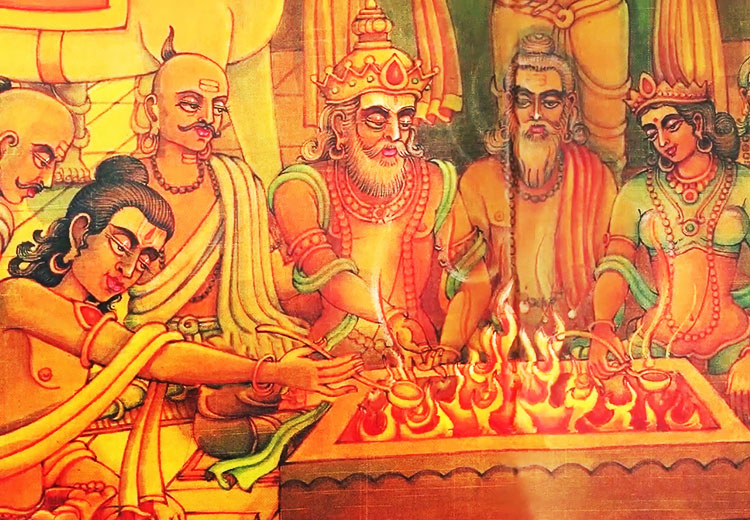In days of yore, the divine assembly, led by Agni and wise sages, approached the exalted Brahma, entreating him to bestow upon them a new commander, for their current chief, Rudra, had entered into a profound penance that would endure for countless years. Perceiving their need, Brahma proposed that Agni might persuade the river goddess Ganga to bear the fiery essence of Siva, which would be endowed with life-giving force and eventually absorbed by Kartikeya, nurtured under the care of the seven holy mothers, the Sapta Matrikas.
Thus, with prayers and reverence, they entreated Ganga, who, under divine blessings, consented to bear Agni’s fiery seed. Yet, unable to withstand its overwhelming heat and cosmic vibrations coursing through her form, Ganga appealed to Agni, confessing her struggle against the fierce, universal flames that consumed her being. Agni advised her to release the seed upon the northern slope of the Himalayas, which she did by Vayu’s grace. Upon contact with the ground, the region transformed into a radiant lake of gold, surrounded by bands of silver, and bordered by hills rich in iron, copper, bronze, lead, and mercury. The union of these elements radiated an energy destined to strengthen the gods’ future commander.
In time, Vayu and Agni brought the child Kartikeya to this energized place, named Mount Saravana. “O Rama,” it was here that all who dwelled assumed a golden hue, and the mountain came to be known as the Golden Mount. Brahma, along with the sages, yakshas, gandharvas, and holy beings, gathered to crown Kartikeya as the supreme commander of the divine hosts. The tale of Ganga and Kartikeya, whosoever hears it with devotion, shall be cleansed of sins; and devotees of Saravana shall ascend to his heavenly realm upon departing from the earth.
Thus spoke Vishwamitra to Rama, Lakshmana, and the gathered sages, inviting them to listen on. “In ages past, there ruled a king of Ayodhya named Sagara, who was deeply troubled by his lack of heirs. His first wife, Kesini, was the daughter of the king of Vidarbha, and his second, Sumati, was the daughter of King Aristanemi. Following the counsel of wise advisors, the king undertook severe austerities in Brugusravana upon Mount Himalaya, accompanied by his queens. They prayed fervently for many years until at last, the great sage Bhrigu appeared, pleased with their devotion. Blessing the king, the sage declared that one queen would bear a single son to bring renown to his lineage, while the other would give birth to thousands of powerful sons.

Upon hearing this, they circumambulated the sage, paying reverence, and humbly requested his presence in their camp for a time, to which he graciously agreed. That evening, the queens approached the sage, eager to know which among them would bear one son and which would bear many. Bhrigu gave them the choice, and Kesini opted for the single son, while Sumati desired the multitude, and so it was granted. In due course, Kesini bore a son named Asamanja, and Sumati gave birth to an egg, which divided into sixty thousand fragments, each transforming into a small and beautiful child. The young princes flourished, though the eldest, Asamanja, grew into a violent and cruel youth, tormenting both citizens and sages alike. His actions reached their height as he terrorized the young sons of Sumati, casting them into the Sarayu River, and drowning and tormenting them.
Seeing this, King Sagara restrained his son and arranged his marriage, which bore a noble son named Amsumantha, a paragon of virtue and valor. Amsumantha soon became recognized throughout the three realms as a man of bravery, wisdom, and compassion, and proved invaluable in aiding the king’s governance.
Years later, King Sagara resolved to perform the sacred Ashwamedha sacrifice in the heart of the Vindyas and Himalayas, setting forth the ritual horse, the Yagasva, to roam freely, guarded by Amsumantha. But Indra, in the guise of a demon, stole the horse. Despite his efforts, Amsumantha could not find it and reported the matter to the king. Through meditation, the king’s council discovered that the horse had been taken to the depths beneath Mount Ukthvadivasa. As per the laws of Manu and Gautama, the thief of the Yagasva was to be slain, and so the king summoned Sumati’s sons and ordered them to scour the land and retrieve the horse. Until their return, the kingdom would remain under Amsumantha’s protection.
Setting forth, they dug the earth far and wide, sparing none in their path. Their actions created a terrible clamor that reverberated through the realms, prompting the gods, Gandharvas, pannagas, uragas, and sages to beseech Brahma, pleading for his intervention. “O Lord,” they cried, “the sons of Sagara rend the earth and slay the innocent without mercy, spreading dread and despair.”
In deep meditation, Brahma listened as the supplicants awaited his grace. And thus, O Rama, let us complete the holy rites before resuming this tale in due course.





